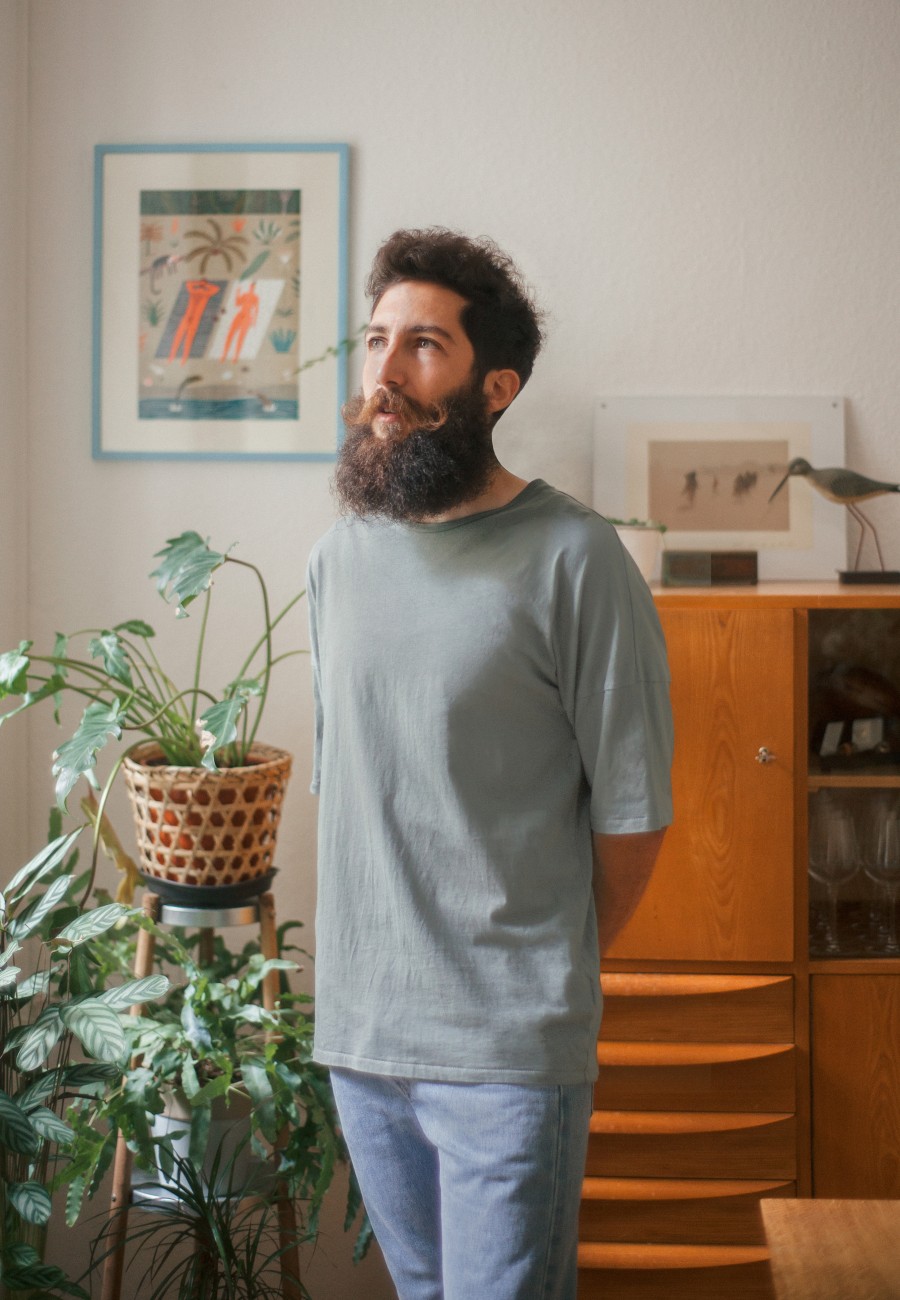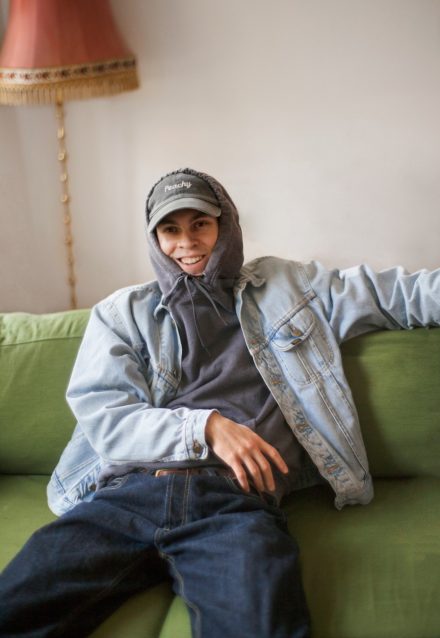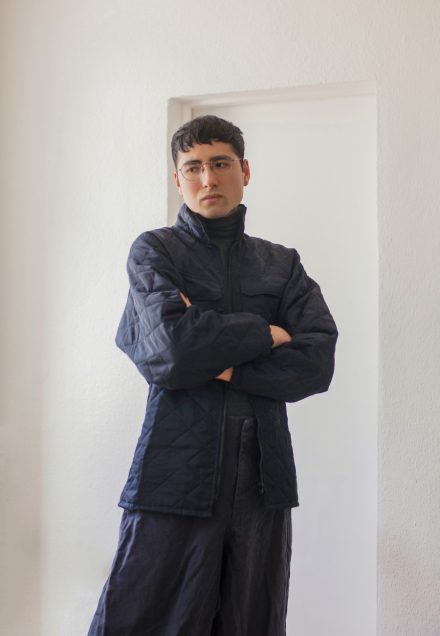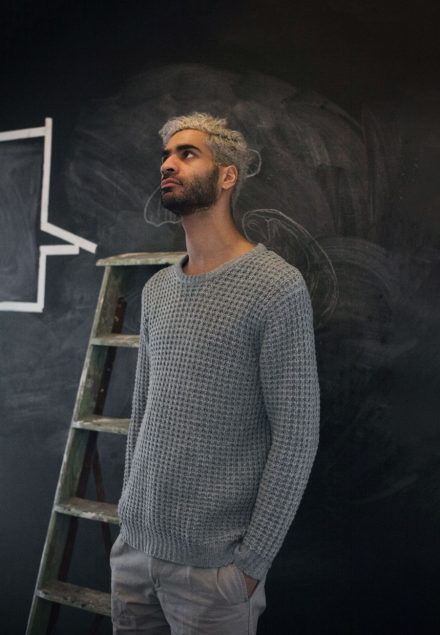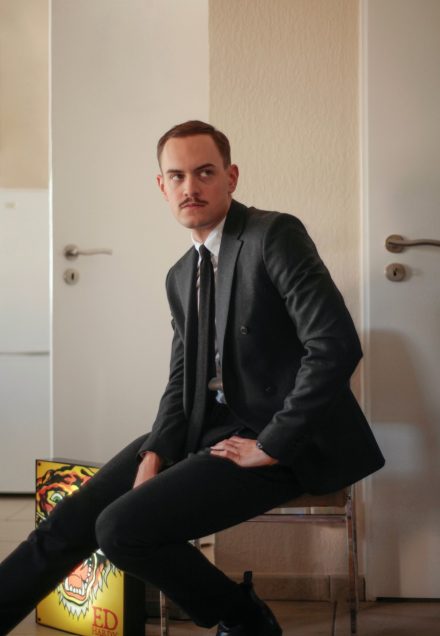How about a guy who likes a frame and a rigorous format? A guy who rarely wears colors and warns against coolness for its own sake. Mo Ganji is a Berlin based tattoo artists with a passion for conscious cuisine. To him fashion is mostly “bad news” and we were eager to find out why…

ΠMagazine: When did you first become interested in tattoos?
Mo: On my 31st birthday, two friends of mine, Momo and Isi, got me a tattoo machine. I kept talking about tattooing, but I didn’t know how to start. That present pushed me to take it more seriously so I approached a local artist, Valentine Hirsch, who gave me the chance to gather some experience and then encouraged me to get my own studio.
ΠMagazine: What does a tattoo represent to you?
Mo: I don’t have tattoos so it’s hard for me to say.
ΠMagazine: In your experience, what does a tattoo represent to other people?
Mo: I guess it depends on the person and the reasons you get it. Some people have a purpose. Some are just interested in art and collect art in forms of tattoos. The body becomes a canvas. But there are also lots of people who get tattoos just to be hip. They want something that upgrades their personality— a tattoo, a pair of shoes, or a watch. In that case, there is no deeper meaning. It’s just on the surface.
ΠMagazine: In terms of ornament, how is a tattoo any different then a piece of clothing then?
Mo: I think, when it comes to upgrading your personality, buying a pair of shorts just doesn’t involve a lot of effort. It’s probably the easiest way of going about it. Whereas, if you want a tattoo, first of all you need to get an appointment, which isn’t easy because of the high demand. Once you have the appointment you probably need to travel. Then of course it’s rather painful and you have to sit through it. So I guess it comes down to the effort. There’s more effort in getting a tattoo, that’s the main difference.

Œ Magazine: I’m sensing a little skepticism when you say “personality upgrade”. What’s wrong about putting your personality out there and highlighting aspects of it visually?
Mo: There is nothing wrong with it and I think it’s very human to look for ways to exhibit our individuality. What makes me mad is that they are often based on capitalism. Some people upgrade their personality by reading a book, trying to gain knowledge or whatever.
Œ Magazine: Yes. We consume a lot. And it’s gotten to the point where we not only consume material goods, we consume trends, and we consume lifestyle; and then we share all of that on Instagram.
Mo: Yes, that’s the point. I don’t mind the people who get a tattoo because it makes them happy, but if you do it because you think other people will like it then I’m not a fan. I mean go ahead, take pictures of your food, I don’t care as long as you are doing it because you love what you’re eating or you’re a chef, but don’t do it because you are desperate for some response. I only have a professional Instagram for my tattoo art. The rest I just share with my loved ones, who I know will appreciate…and that’s me. It’s not about good or bad, but it certainly annoys me to see the all this stuff everywhere.
ΠMagazine: I agree that the amount of avocado pictures that are currently thrown at us is slightly out of control, but sharing impressions and moments of your routine can be inspiring to a certain degree. Personally, I like seeing the everyday life impressions and events that inspire my favorite artists in my feed. You probably follow other tattoo artist too, right?
Mo: Because I love tattoos.
ΠMagazine: Right!
Mo: This is going to sound weird, but I’m very proud of what I do and I think you should never be ashamed of sharing something if you really love it, or posting it for that matter. I’m happy with my work and I appreciate when other people appreciate it. But so many people don’t really care about the avocado. They buy it because it’s hip but have no clue about avocados, when they should eat them and so on. That’s what makes me so mad!
ΠMagazine: Of course, if this is your mindset, being passionate and making a living out of the epitome of cool, namely tattoos, is complicated. How do clothes fit into all of this for you?
Mo: Well, I get dressed every day, right? But it’s not something that conditions my life. Like getting a hair cut, it’s not a big deal. And believe it or not it’s illegal to walk around naked. I’m not a very fashionable guy.
Œ Magazine: That’s not for you to say. But why do you think that?
Mo: I was raised by my mum, and there was never much money for clothes. I had a pair of sneakers that I loved and a jacket, but I don’t recall wanting the hip stuff or being sad we couldn’t afford it. As a Teenager I cared more about fashion then I do now. At that point it became about being cool, accepted and so on, and of course getting the girls attention. But other than for these reasons I really never cared about fashion. Now as a grown man I don’t dress to “impress” and try to keep it simple. I have a format I apply to everything: I put a frame on things and then within this frame I do whatever I want. So, for example, when I draw I restrict myself to one line and when I get dressed it’s the same — I restrict myself to black and other than that I have no rules.
Œ Magazine: What’s the reason for this format?
Mo: I like to make stuff easier. It’s a very complicated world, we constantly have to make so many decisions and to me the most precious thing is time, so blending out some variables helps me. I do it with food as well. I care about nutrition. I would say it’s my biggest passion after tattooing. I’m vegan, gluten free, sugar free, I fast, and like to know where my food comes from. And not because it’s hip, but because it has an effect on me and once again because I need a frame. I would go crazy if I had to follow trends or go shopping.
ΠMagazine: What happens when you go shopping?
Mo: I hate it. But that’s probably because I hate people.
ΠMagazine: (laughs)!
Mo: My routine is very very slow and when I go to the city or have to buy a T-shirt the speed and the energy of everything makes me sick. This is something I realized once I took a step back from the system and started being a little isolated. Of course, I’m still part of it. I’m meeting you and you are a part of it, ironically.
Œ Magazine: Do you think you would feel comfortable stepping into a public space or doing what you love, going to your studio for example, wearing someone else’s clothes?
Mo: Probably not, but not because of the fashion.

ΠMagazine: Is it a matter of identity? Would you feel like your normal people-hating-self if you were wearing the clothes of a friend with an entirely different style?
Mo: No, but I try to define myself as little as possible through clothes. I like to keep it classic, so that when you look at me in ten years, I’ll probably be wearing the same T-shirt and the same pants. That’s also a decent solution if you care about sustainability. And that’s a big concern of mine. I try to consume very conscientiously and care about where things come from. If I have the feeling that something isn’t fairly produced I really feel ashamed.
ΠMagazine: How long have you been doing this?
About two years now and it has become a matter of integrity. Like, I wouldn’t be able to take myself seriously if I’d go shopping at conventional stores after having this conversation with you, but it’s not easy and sometimes I still find it hard to look in the mirror. For example, I just bought a new phone. I needed one because mine had died after five years and I didn’t want to support the big names out there, but then I couldn’t find a sustainable alternative with a decent camera. I’m a visuell artist so to me the camera actually counts more then the smartphone. The decision came down to: “clean” cellphone plus separate “dirty” camera or “dirty” cellphone with decent built in camera. Sometimes you are sort of pushed to do these things and it really bothers me to not be in control.
Œ Magazine: It’s becoming harder to have that kind of control over the products we surround ourselves with.
Mo: Very hard! Every day we are told we need more and more and I don’t want to be part of this spiral.
Œ Magazine: And it’s easy to fall into thinking you need something you didn’t even know existed two minutes earlier.
Mo: Yeah. Don’t you ever…? I mean, you consume, right? Don’t you think about it?
Œ Magazine: I do. I understand and relate to your concerns and the shame you were mentioning, but I also believe that, every now and then, treating yourself to something nice, enjoying a moment and what that moment is made of, material things included, without questioning it, will make you stronger at fighting your battles (be it sustainability or something else). Plus, in my opinion, no one can fight all the fights at the same time. You pick one or two depending on your resources and age, the time and money you have. Maybe you set some goals, like shopping better brands that have fair production and then, when you have more resources, you can add something new to the list like buying only organic food. But it’s a contradictory thought process. I mean, when you are a 20-something student, in say, Munich, organic food isn’t exactly affordable. You know what I mean?
Mo: I understand your point but the way I see it, you can always say “Hey, I’m good with two new t-shirts a year, if that means I can buy organic food.” Then I you get to spend ten bucks on tomatoes. But that’s me…

Œ Magazine: Sure. But the example we picked is your fight! Imagine someone would come up to you and say. “Wow, look at this apartment. So much space! And then start talking politics and encourage you to open your home to refugees…” It’s only an example and what I’m trying to say is, it’s okay you don’t, because you are already investing significant time in making yourself aware of other touchy matters. Those are your fights!
Mo: Mmm. I don’t know. I don’t want refugees in my home because I never thought about it. But step by step, I’m trying to be a good person. And right now I’m very rich. Not in terms of money, but in terms of time! I work two hours a day and that leaves me with eight hours to think about stuff. So I have those resources and should be making good decisions. There is no excuse for me. And with all these things on my mind, fashion is the least of my concerns as long as I feel comfortable.
Œ Magazine: You weren’t born comfortable though, were you?
Mo: Hell no! I looked like goofy in my teeny years to get attention and the way I dress now was no overnight idea either. It kind of happened gradually. I wore a basic shirt every other day and then it became a habit until I was only buying basic shirts. I’m quite boring, my girlfriend calls me “old turtle”. Although I still like to think I’m a Tiger…
Œ Magazine: Have you ever done something to be cool or get someone’s attention?
Mo: Of course. We all did. For example, I hate alcohol, but when I was sixteen, I remember feeling like I had to drink beer to be cool and it tastes horrible. Come on, you can’t tell me beer tastes good?!
ΠMagazine: Beer tastes horrible, agreed. But you should really give wine a chance! (laughs)
Mo: Anyway, that’s one of many examples. Things I did as a kid to get attention and appreciation, which I believe to be very natural. I just feel like this tendency is getting a bit out of control. Again, as long as you really believe in what you do and it feels right then it’s the right thing for you. It doesn’t matter if it’s being trendy, vegan, or socially responsible; if you do it because you think it’s cool, do yourself a favor and don’t!
Œ Magazine: But you said it yourself — longing for appreciation is very natural and not everyone is lucky enough to have that inner circle, a partner or some good friends who provide them with the “good job” stamp we all need every now and then. My point is, people are insecure and an easy way of getting some validation is following a trend or whatever it is that makes you part of a group.
Mo: Sure. I suppose I’m lucky I don’t need trends for validation then.
ΠMagazine: Do you remember ever talking about clothes with your colleagues at your previous job? You worked in retail, right?
Mo: Yes, but it was mostly production related. We would discuss ways of producing more at lower prices, ways to exploit trends, and making more money out of them. That’s another explanation for my perspective on fashion, I suppose. It made me sick. When you’re standing in a factory, telling a colleague “this kid is not 16, he’s 9 or 10” and then they show you the papers where it says 16 and for that moment you choose to accept it and fool yourself even though you know it’s wrong. I’m very glad I’m not in that situation anymore, but everything here is still based on that. Our trends, our lifestyle are based on other people’s bad luck. So I can’t help that negative feeling. Every time I see a ten buck t-shirt I inevitably think of the process of producing it. Come on! The water necessary for the cotton is worth more than that…
Œ Magazine: It’s brutal. I feel like there’s a little hope though…
Mo: I don’t have hope for humanity.
Œ Magazine: Yeah, I can tell. You’ve made that pretty clear…
Mo: I don’t think we can change the system. It’s a matter of awareness and most people don’t have time for awareness. So it’s a matter of awareness and time. And it starts with food which I find to be very interesting. It’s something we do every day, just like getting dressed only that unlike food, clothes are not necessary for survival. I mean if you can’t even make yourself aware of what you are eating how can you even think of affecting significant change on a larger scale?

Œ Magazine: You probably can’t. But don’t you think the eco-health trend for example has good potential? Because it pushes the industry to make healthy things accessible, and when you look at the big picture, it doesn’t matter if the person who is choosing to cut back on her plastic is doing it to impress her cool neighbors or because she actually wants to affect change, as long as she’s doing it!
Mo: Mmm. The problem with trends though is that they are not trendy forever. So eventually, all the people who are cutting back on plastic to impress their cool neighbors will stop doing it and move on to the next thing and we are back to the starting point. I also feel very sorry for us because it’s arrogant and a little pathetic to worry about destroying nature with our plastic bags or coffee cups. Our garbage will be gone in a million years and nature will be fine, nature was always fine. Only by then we will have killed ourselves with all the pollution!
Œ Magazine: You are right! What can you tell me about men’s fashion in Berlin?
Mo: Berlin is very authentic, but I really know little about fashion. I grew up in Spandau. Probably one of the un-hippest places in Berlin and I’m Persian so I grew up with Turkish and Russian kids and somehow I feel like these kids are more authentic than most kids in Friedrichshain and Prenzlauer Berg, because it’s who they are. They just put their sneakers on and are good to go.
ΠMagazine: Why are the sneakers more important then something else?
Mo: Because it’s their uniform and makes them part of that community. Isn’t that what fashion is about other than the things we mentioned before?
ΠMagazine: Absolutely. Apart from being authentic, how else would you describe Berlin style?
Mo: You know I just came back from Cologne and everyone was so posh. Berlin is more like, “I found this jacket at my friend’s house and it fits.” It’s hip but it’s more urban. One of my very few friends always wears this hat and this shirt and then has these dress shoes in different colors. And I think there are lot’s of people like him here. People who have a uniform and sort of care without caring, especially Neukölln and Kreuzberg where there is not much money.
Œ Magazine: Why is the Neukölln style so recognizable?
Mo: In Neukölln there’s no money so the style you know from the Neukölln streets and have the clear Neukölln association is the only style one can afford.
Œ Magazine: You think people in Neukölln have limited options in terms of clothes and that’s why they end up being cool all wearing, say, a beanie paired with a secondhand trench coat?
Mo: Of course. I think money has a very big impact on this kind of stuff. If you give everyone a thousand bucks there would be a lot more diversity! When you don’t have access to money you are kind of forced to combine the things you own in a million ways before getting new stuff. And if you’re an artist, and there are many artists and creative students in Neukölln, you get creative with what you have!
